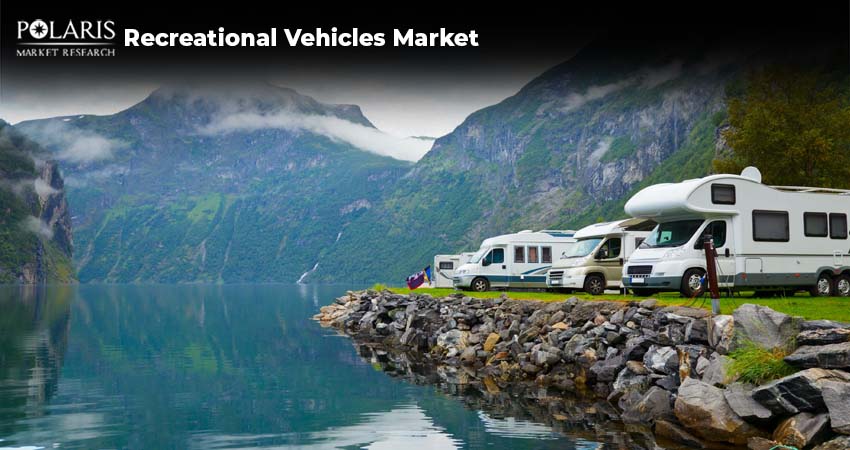Comprehensive Overview of Top 5 Companies Shaping Recreational Vehicles Market

In recent years, recreational vehicles have surged in popularity, becoming synchronous with freedom, adventure, and home-away-from-home experiences. Whether it is a cross-country road trip, a weekend getaway, or a full-time nomadic lifestyle, RVs offer unparalleled flexibility and comfort. As more people seek flexible, comfortable, and self-sufficient travel solutions, RVs have evolved into a booming market segment with advanced features, from smart automation to eco-friendly innovations.
From luxury motorhomes to compact camper vans, manufacturers offer a wide range of recreational vehicles to cater to a diverse range of consumers. In this blog, we’ll dive into the world of recreational vehicles, explore the latest trends, and highlight the key companies driving this thriving market.
Evolution of Recreational Vehicles
A recreational vehicle (RV) is a motor vehicle or trailer that has living quarters. RVs can be used for travel, camping, and recreation. They come in a variety of types, including motorhomes, campervans, and travel trailers. Recreational vehicles have come a long way since their humble beginnings in the early 20th century. What started as simple trailers and makeshift campers has evolved into a multi-billion-dollar industry offering a wide array of options for every type of traveler.
Modern RVs are equipped with innovative amenities, including solar panels, smart home systems, and even Wi-Fi connectivity. This evolution reflects a growing demand for convenience and sustainability as consumers increasingly prioritize eco-conscious travel and off-grid capabilities. The RV lifestyle has also gained traction among younger generations, with millennials and Gen Z embracing the idea of minimalism and remote work. As a result, manufacturers are focusing on creating versatile, tech-savvy vehicles that cater to this new wave of adventurers.
Emerging Trends in RV Market
- Tech-Integrated RVs: Technology is revolutionizing the RV experience. From advanced driver assistance systems to app-controlled lighting and temperature, modern RVs are designed to enhance convenience and connectivity. Some models even offer built-in drones for aerial photography, catering to the growing demand for unique travel content.
- Rental and Sharing Economy: The rise of RV rental platforms like Outdoorsy and RVshare has made RV travel more accessible to those who don’t want to commit to ownership. This trend is particularly appealing to first-time users and occasional travelers.
- Sustainability and Eco-Friendly Designs: As environmental concerns take center stage, RV manufacturers are incorporating sustainable practices into their designs. Solar-powered RVs, energy-efficient appliances, and lightweight materials are becoming standard features. Companies are also exploring electric and hybrid models to reduce carbon emissions and appeal to eco-conscious consumers.
- Customization and Personalization
Today’s consumers want RVs that reflect their style and needs. Manufacturers are offering customizable floor plans, interior designs, and modular features, allowing buyers to create their dream mobile home.
Leading Companies in Recreational Vehicle Market
- Thor Industries
Brands: Silver Bullet Trailers
Headquarters: Elkhart, Indiana, USA
Established: 1980
Thor Industries is a public company that has established itself as a leading global manufacturer of RVs. The company owns several well-known brands, including Airstream, Jayco, and Dutchmen. Thor Industries continues to lead the market with a diverse portfolio catering to all segments of RV enthusiasts.
Key Products: Winnebago Class A Motorhomes
Headquarters: Eden Prairie, Minnesota, USA
Established: 1958
Winnebago Industries designs and manufactures a wide range of RVs, including motorhomes, travel trailers, and fifth wheels. They are known for their advanced technology and design. The company has embraced innovation with its eco-friendly models and compact designs, appealing to both traditional buyers and younger adventurers. Winnebago Industries also manufacture Winnebago Specialty Vehicles, Newmar, Barletta, Lithionics Batteries, and Chris-Craft.
- Hymer GmbH
Brands: Bürstner
Headquarters: Bad Waldsee, Germany
Established: 1957
A leading European RV manufacturer, Hymer is known for its innovative designs and high-quality craftsmanship. Hymer has been making motorhomes and caravans "Made in Germany" since its founding in 1957. Hymer markets its products under brands like Eriba Caravans, Hymer Camper Vans, Hymer Original Parts, and Hymer Motor Caravans. The company has made significant strides in the North American market, offering a range of motorhomes and camper vans.
Brands: Fleetwood RV
Headquarters: Brookfield, Wisconsin, USA
Established: 2008
REV Groups is a designer, manufacturer, and distributor of specialty vehicles and related parts and services. REV Group's Specialty Vehicles Segment provides customized vehicle solutions for public services and commercial infrastructure. It manufactures a variety of recreational vehicles (RVs), including Class A motorhomes, truck campers, Class B vans, and travel trailers. Their luxury models are designed for travelers seeking the ultimate comfort and sophistication on the road.
- Forest River
Brand: Coachmen
Headquarters: Elkhart, Indiana, USA
Established: 1996
A subsidiary of Berkshire Hathaway, Forest River is the leading manufacturer of RVs, cargo trailers, and pontoon boats in North America. It is also one of the major distributors of commercial vehicles and the top producer of buses and vans in the nation. The company offers a wide range of products, from luxury motorhomes to affordable travel trailers, under brands like Shasta and Coachmen.
Future of Recreational Vehicles
The future of RVs looks promising, with companies investing in sustainability, automation, and customer-centric designs.
What’s Next?
- Fully Autonomous RVs: Self-driving motorhomes with AI-powered road assistance.
- Off-Grid Living Enhancements: Improved solar tech and water recycling systems for remote travel.
- Modular & Expandable RVs: Customizable living spaces with AI-powered optimization.
- EV & Hydrogen-Powered RVs: Advancements in electric and hydrogen fuel cell vehicles for zero-emission travel are also transforming RV travel.
With such developments, RV travel will become more sustainable, convenient, and widely accessible.
Enabling Digitial Nomad Lifestyles
Recreational vehicles have transcended their traditional role as vacation vehicles, becoming a symbol of freedom, adventure, and innovation. With sustainability, technology, and customization at the forefront, the RV industry is poised for a bright future. As more people embrace location-independent lifestyles, RVs will become not just a mode of travel but a way of life. Manufacturers will need to adapt to this shift by creating vehicles that cater to the needs of digital nomads, including ergonomic workspaces and reliable internet connectivity.

